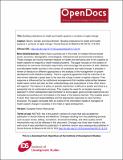| dc.contributor.author | Bloom, Gerry | |
| dc.contributor.author | Wolcott, S. | |
| dc.date.accessioned | 2014-04-15T12:07:45Z | |
| dc.date.available | 2014-04-15T12:07:45Z | |
| dc.date.issued | 2013-12-12 | |
| dc.identifier.citation | Bloom, Gerald, and Sara Wolcott. "Building institutions for health and health systems in contexts of rapid change." Social Science & Medicine 96 (2013): 216-222. | en_GB |
| dc.identifier.issn | 0277-9536 | |
| dc.identifier.uri | https://opendocs.ids.ac.uk/opendocs/handle/20.500.12413/3810 | |
| dc.description.abstract | Many Asian countries are in the midst of multiple interconnected social, economic, demographic, technological, institutional and environmental transitions. These changes are having important impacts on health and well-being and on the capacity of health systems to respond to health-related problems. This paper focuses on the creation of institutions to overcome information asymmetry and encourage the provision of safe, effective and affordable health services in this context of complexity and rapid change. It presents a review of literature on different approaches to the analysis of the management of system development and institution-building. There is a general agreement that the outcome of an intervention depends a great deal on the way that a large number of agents respond. Their response is influenced by the institutional arrangements that mediate relationships between health sector actors and also by their understandings and expectations of how other actors will respond. The impact of a policy or specific intervention is difficult to predict and there is a substantial risk of unintended outcomes. This creates the need for an iterative learning approach in which widespread experimentation is encouraged, good and bad experiences are evaluated and policies are formulated on the basis of the lessons learned. This enables actors to learn their roles and responsibilities and the appropriate responses to new incentive structures. The paper concludes with an outline of the information needs of managers of health system change in societies in the midst of rapid development. | en_GB |
| dc.description.sponsorship | ESRC | en_GB |
| dc.language.iso | en | en_GB |
| dc.publisher | Elsevier | en_GB |
| dc.rights | NOTICE: this is the author’s version of a work that was accepted for publication in Social Science and Medicine. Changes resulting from the publishing process, such as peer review, editing, corrections, structural formatting, and other quality control mechanisms may not be reflected in this document. Changes may have been made to this work since it was submitted for publication. A definitive version was subsequently published in Social Science & Medicine 96 (2013) DOI http://dx.doi.org/10.1016/j.socscimed.2012.12.014 | en_GB |
| dc.rights.uri | http://www.ids.ac.uk/files/dmfile/IDSOpenDocsStandardTermsOfUse.pdf | en_GB |
| dc.subject | Health | en_GB |
| dc.title | Building institutions for health and health systems in contexts of rapid change | en_GB |
| dc.type | Article | en_GB |
| dc.rights.holder | Social Science and Medicine (Elsevier) | en_GB |
| dc.identifier.externaluri | http://dx.doi.org/10.1016/j.socscimed.2012.12.014 | en_GB |
| dc.identifier.team | Knowledge Technology and Society | en_GB |

